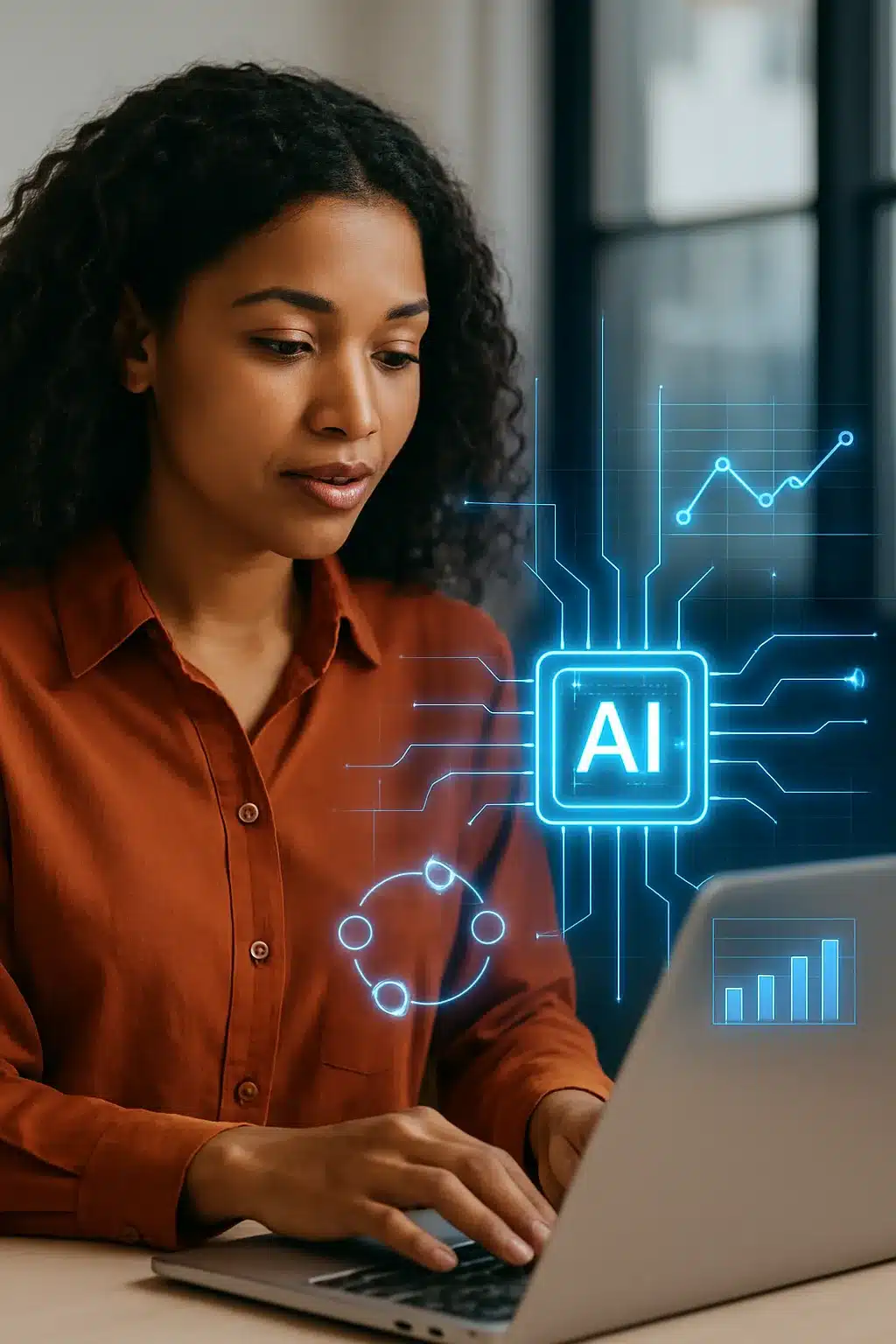Project Management and AI: Reshaping Practices in the Digital Era
Author: Hajime Estanislao, PMP®; Editor: Geram Lompon; Reviewed by: Alvin Villanueva, PMP®, PMI-ACP®
Projects face increasing complexity, tighter timelines, and growing stakeholder expectations. Traditional
By combining
AI promises to automate repetitive tasks, strengthen project data analysis, and improve decision-making. At the same time, project managers must balance AI’s capabilities with human oversight, creativity, and collaboration.
By blending
Why Project Management and AI Intertwine
Project management, AI tools, and team collaboration share common goals: addressing uncertainty, analyzing data, and delivering results.
- Project management provides governance, structure, and stakeholder engagement.
- AI tools analyze historical project data, identify trends, and automate routine tasks.
- Project managers connect these contexts by applying strategic thinking, leading project teams, and ensuring project success.
At ROSEMET, we see these three elements coming together because:
- Shared Focus on Adaptability: AI’s ability to analyze data, automate tasks, and generate insights improves processes by enabling plans to be adjusted efficiently, mirroring a project’s iterative cycles. Both rely on feedback and learning from past performance.
- Data as a Foundation: AI in
project management depends on relevant data. Project managers ensure transparency, track progress, and capture project performance. - Empowering Teams: AI automates repetitive tasks while project managers focus on coaching, strategy, and stakeholder communication.
- Balancing Human and Machine Strengths: AI enhances
project management efforts, but project managers ensure data-driven decisions go together with empathy or creativity.

What Do We Mean by AI in Project Management ?
AI in
- Task automation: AI automates repetitive tasks such as updates, project progress reporting, and resource allocation.
- Predictive analytics: Machine learning models use historical project data to forecast project delays, identify potential risks, and improve project success rates.
- Natural language processing: Improves project communication, summarizes project data, and generates routine documentation.
- Virtual assistants: Support project managers with automated task management and reminders, helping with multiple projects simultaneously.
Example: During project planning, AI tools analyze past performance and resource availability to generate forecasts. These tools assist in creating and refining the project plan by automating the development of project timelines, optimizing resource allocation, and identifying task dependencies based on historical data and similar past projects.
The project manager then adjusts project plans and project timelines, balancing AI-driven insights with the project team’s skills and context.
Core Concepts: Project Management , AI Tools, and Human Collaboration
Project management thrives on structure, adaptability, and clear communication. AI expands these capabilities with automation, analytics, and task management. When managing projects, AI tools enhance the process by automating repetitive tasks, supporting decision-making, and streamlining workflows throughout the project lifecycle.
- Project management: Focus on the project lifecycle, project tasks, and successful project outcomes.
- AI tools: Provide predictive analytics, automate routine tasks, and generate data-driven insights to assist in managing projects efficiently.
- Human collaboration: Teams depend on trust, critical thinking, and creativity. AI supports decision-making but cannot replace empathy.
Automated Task Management: Streamlining the Routine
Automated task management is transforming the way project managers approach routine work. With the rise of AI
This automation allows project managers and their teams to focus on high-priority activities that require strategic thinking and creativity, rather than getting bogged down by manual processes.
AI
Automating repetitive tasks is essential for achieving successful project outcomes. By streamlining routine tasks, AI
Effective automated task management is now a cornerstone of modern

Step-by-Step: Smarter Projects with AI
- Automate Tasks: Utilize AI solutions on routine tasks such as project tracking and status updates.
- Forecast with Data: Apply machine learning to analyze historical project data and predict risks.
- Optimize Resources: Let AI identify the best use of team members’ skills and manage multiple projects efficiently.
- Monitor Performance: Track key performance indicators and project success rates with AI-powered dashboards.
- Support Collaboration: Use natural language processing for task updates, meeting summaries, and project communication.
- Implement AI Effectively: Assess your organization’s readiness, select compatible AI tools, and train your teams to implement AI solutions into your
project management processes.
Best Practices for Integrating AI (ROSEMET Guidelines)
- Start Small: Automate low-risk project tasks such as scheduling or task updates.
- Prioritize Data Quality: Clean and reliable project data improves AI’s ability to generate accurate insights.
- Train for Balance: Support project managers in combining AI insights with strategic thinking.
- Promote Collaboration: Ensure project teams remain engaged, questioning, and validating AI outputs.
- Leverage AI for Risk Management: Use AI tools for proactive risk management, including risk prediction, contingency planning, and threat detection during project execution.
- Measure Value: Focus on project outcomes and project success, not just automation speed.
Considerations: Human Judgment Matters
AI capabilities are powerful, but human judgment defines project success. Project managers must use empathy, creativity, and leadership to interpret AI-generated insights.
ROSEMET Best Practice: Always involve project managers in decision-making. AI identifies trends and supports project tasks, but humans determine the final course of action.
Upskilling and Reskilling: Preparing Project Teams for AI
As AI tools become an integral part of
Training team members to work effectively with AI
AI tools themselves can assist in this process by identifying skill gaps within the team and recommending personalized training and development opportunities tailored to each individual’s needs.
This proactive approach to upskilling ensures that project teams remain competitive and capable of handling the evolving demands of modern
ROSEMET Best Practice: Invest in ongoing training for your project teams, focusing on both technical skills and strategic thinking. Empower your team to use AI
Wrapping Up: A Practical Way Forward
Project management and AI are complementary forces. Together, they allow project managers to manage projects more effectively, automate repetitive tasks, and strengthen project performance.
ROSEMET emphasizes that while AI’s ability to analyze data and automate tasks is valuable, project managers and project teams must preserve collaboration, adaptability, and creativity. By thoughtfully integrating AI tools, project managers can deliver projects with greater accuracy, track progress more effectively, and achieve sustainable success.
References:
Agilemania. (2024, January 15). The impact of generative AI on software development. Agilemania. https://agilemania.com/generative-ai-impact-on-software-development
Cognilytica. (2024). Cognitive
Forbes Technology Council. (2024, June 24). AI meets Agile: Transforming
Harvard Business Review. (2023, February 21). How AI will transform

